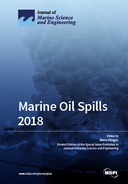Explore

The mitigation of oil spills is an important facet of environmental protection. Understanding oil spills is a first step toward preventing and minimizing their damage to the environment. This compilation presents several of the current studies related to such an understanding of oil spills and the environment.<false,>This book is a compilation of 14 papers presenting new developments in the field of oil spills, giving insight into the rapidly changing world of oil spill studies and technology. The 14 papers included cover topics varying from risk analysis to oil spill remote sensing. Broadly categorized, included are six papers on modeling, four papers on remote sensing, three papers on risk assessment, and one paper on oil spill countermeasures. Each paper presents a unique insight into a facet of oil spill research and technology. The authors of these papers represent many different countries and affiliations around the world.
This book is included in DOAB.
Why read this book? Have your say.
You must be logged in to comment.
Rights Information
Are you the author or publisher of this work? If so, you can claim it as yours by registering as an Unglue.it rights holder.Downloads
This work has been downloaded 260 times via unglue.it ebook links.
- 70 - pdf (CC BY-NC-ND) at Unglue.it.
Keywords
- Access Western Blend (condensate/bitumen-dilbit)
- arithmetic operations with rank values
- BLOSOM
- Campeche Bay
- coastal flow
- coastal protection
- contingency plan
- contingency planning
- Decision support systems
- dispersant
- dispersion effectiveness (DE)
- electromagnetic roughness
- Emergency management
- environmental monitoring
- environmental resources
- exploratory data analysis
- Foss Barge
- FVCOM
- GNOME
- Gulf of Mexico
- Heidrun
- hindcast
- History of engineering & technology
- impact modeling
- Italian seas
- Kotor bay
- Lagrangian particle dispersion
- LES
- low atmosphere
- M/V Marathassa oil spill
- man-made oil spills
- marine information systems
- Marine pollution
- methods of vulnerability mapping to oil
- model comparison
- multi-frequency detector
- multiple observations
- n/a
- naturally-occurring oil seeps
- non-breaking ocean waves
- numerical forecasting tool
- Numerical Simulation
- ocean trajectory
- oil slicks characterization
- oil spill
- oil spill accidents
- oil spill mitigation plans
- oil spill model
- oil spill pollution
- oil spill response
- oil spill risk analysis
- oil spills
- oil thickness
- oil-slick discrimination algorithm
- ordinal values
- OSCAR
- Outer Continental Shelf
- petrogenic oil-slick category
- Point Wells
- polarimetric SAR data (PolSAR)
- polarized SAR data
- Princeton Ocean Model
- proactive systems
- probability density function
- probability of detection
- PROMETHEE methodology
- RADARSAT
- random walk method
- RANS
- reflection coefficient
- Remote sensing
- risk modelling
- Salish Sea
- sea-coastal zones
- signal integration
- simulation
- statistical analysis
- statistical region-based classification
- synthetic aperture radar
- Synthetic Bitumen (synthetic crude/bitumen-Synbit)
- Technology, engineering, agriculture
- Technology: general issues
- the English Bay
- the problems of vulnerability maps development
- trajectory analysis
- trajectory model
- UAVSAR
- uncertainty maps
- Vancouver Harbour
- wave tank
- Western Canadian Select (condensate mixed with synthetic crude/bitumen-dilsynbit)
- windage
Links
DOI: 10.3390/books978-3-03897-855-8Editions


